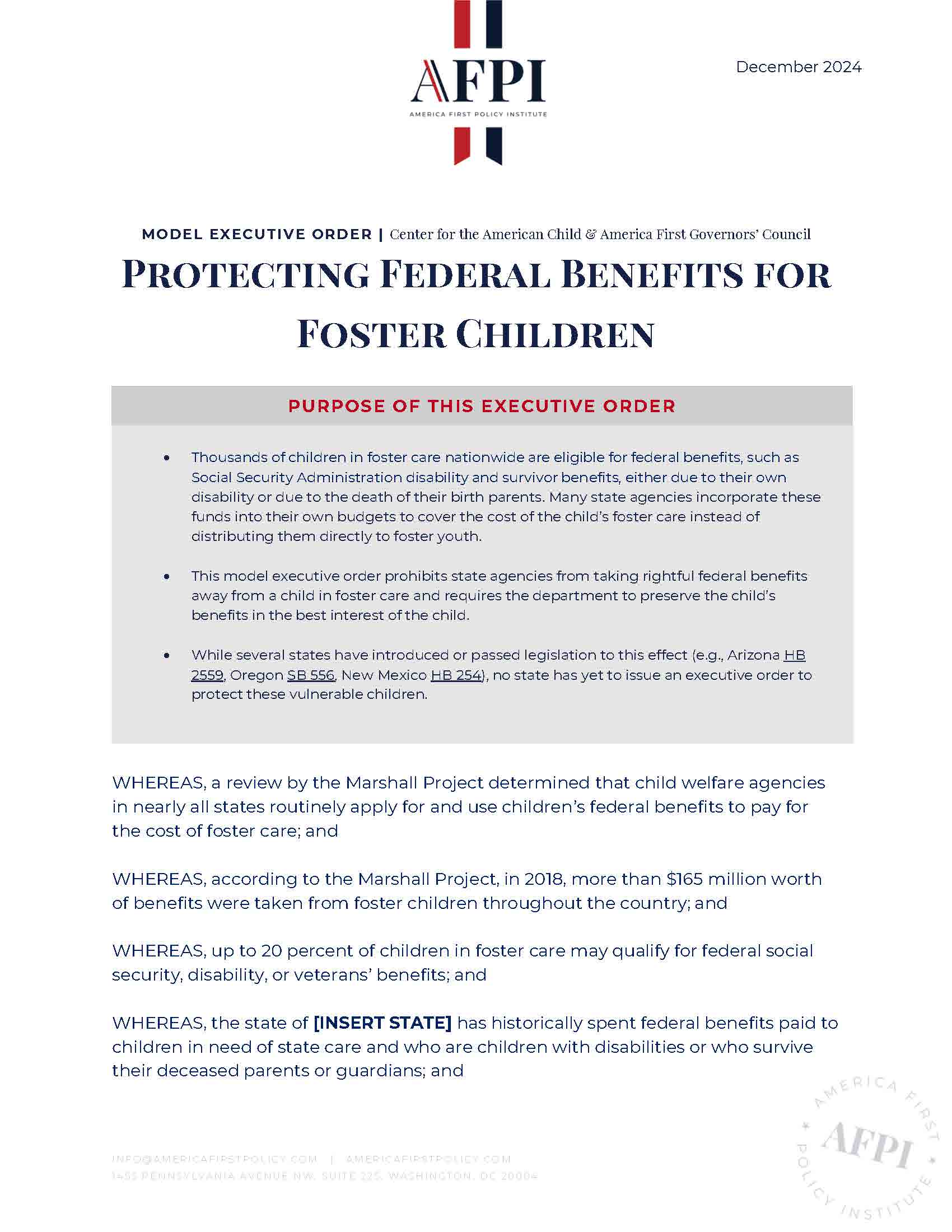Protecting Federal Benefits for Foster Children
Key Takeaways
Thousands of children in foster care nationwide are eligible for federal benefits, such as Social Security Administration disability and survivor benefits, either due to their own disability or due to the death of their birth parents. Many state agencies incorporate these funds into their own budgets to cover the cost of the child’s foster care instead of distributing them directly to foster youth.
This model executive order prohibits state agencies from taking rightful federal benefits away from a child in foster care and requires the department to preserve the child’s benefits in the best interest of the child.
While several states have introduced or passed legislation to this effect (e.g., Arizona HB 2559, Oregon SB 556, New Mexico HB 254), no state has yet to issue an executive order to protect these vulnerable children.
WHEREAS, a review by the Marshall Project determined that child welfare agencies in nearly all states routinely apply for and use children’s federal benefits to pay for the cost of foster care; and
WHEREAS, according to the Marshall Project, in 2018, more than $165 million worth of benefits were taken from foster children throughout the country; and
WHEREAS, up to 20 percent of children in foster care may qualify for federal social security, disability, or veterans’ benefits; and
WHEREAS, the state of [INSERT STATE] has historically spent federal benefits paid to children in need of state care and who are children with disabilities or who survive their deceased parents or guardians; and
WHEREAS, in [YEAR], the [INSERT APPROPRIATE STATE DEPARTMENT] used $[TOTAL AMOUNT OF FOSTER BENEFITS SPENT] of federal benefits to cover the cost of care; and
WHEREAS, when states remove a child from a child’s home, placing the child in the care and custody of the child welfare system, the state is financially responsible for the cost of care; and
WHEREAS, the [INSERT APPROPRIATE STATE DEPARTMENT] routinely screens children for benefit eligibility, applies for these benefits, usually receives the funds, and spends the child’s benefits without notifying the child; and
WHEREAS, conserving benefits for children’s future needs is just and equitable, especially for children with disabilities or deceased parents;
ACTIONS OF THE EXECUTIVE ORDER
NOW THEREFORE, I, [INSERT GOVERNOR], Governor of the State of [INSERT STATE], by virtue of the authority vested in me by the Constitution and laws of this State, do hereby order and direct the following:
1. The [INSERT APPROPRIATE STATE DEPARTMENT] shall screen every child currently in care and every child who enters care hereafter to determine if the child is receiving or may be eligible for federal benefits administered by the Social Security Administration (SSA), U.S. Department of Veterans Affairs (VA), or Railroad Retirement Board (RRB). The department shall screen every child within 60 days of entering care and annually thereafter.
- If a child is receiving federal benefits, the [INSERT APPROPRIATE STATE DEPARTMENT] shall determine whether the current payee is adequately preserving the benefits or whether a different representative payee would better prioritize the child’s best interests.
- If a child is not receiving federal benefits, but the [INSERT APPROPRIATE STATE DEPARTMENT] determines that a child may be eligible for federal benefits, the department shall apply for benefits on behalf of the child.
- The [INSERT APPROPRIATE STATE DEPARTMENT] shall provide written notification to the child and the child’s legal representative of an application for federal benefits and any determination regarding the outcome of the application, as well as any appeal and appellate decision.
- If a child in the care and custody of the [INSERT APPROPRIATE STATE DEPARTMENT] is eligible for benefits administered by the SSA, VA, or RRB, the department shall work collaboratively with the child and the child’s legal representative, to determine a suitable representative payee. The department may serve as a representative payee and receive funds on behalf of the child as a last resort when no other suitable candidate is available.
2. When serving as the representative payee, the [INSERT APPROPRIATE STATE DEPARTMENT] shall not use the child’s benefits for maintenance payments or special allowances as defined in 42 U.S.C.A. §675(4)(A) for a child of similar age.
- The department, when serving as representative payee, shall use a child’s funds for expenses necessary to satisfy the child’s current, individual, and unmet needs and shall conserve a child’s benefits for future needs. Expenditure of a child’s federal benefits shall be made in consultation with the child and the child’s legal representative. Communication with the child shall be conducted in an age-appropriate manner.
3. The [INSERT APPROPRIATE STATE DEPARTMENT], consistent with federal law and policy, shall meet with the child and the child’s legal representative and engage with them regularly to ascertain the child’s current unmet and foreseeable needs.
4. When serving as the representative payee, the [INSERT APPROPRIATE STATE DEPARTMENT] shall deposit a child’s benefit payments in a special needs trust, a pooled special needs trust, an achieving a better life experience account (ABLE or 529A account), or other trust account that will not interfere with federal and state asset limitations.
5. The [INSERT APPROPRIATE STATE DEPARTMENT] shall provide training to agency personnel regarding fiduciary obligations when serving as representative payee, and said training must incorporate establishing, monitoring, and using proper financial vehicles to preserve benefit eligibility.
6. The [INSERT APPROPRIATE STATE DEPARTMENT] shall provide the child with an annual accounting of the use, application, or conservation of the child’s benefits.
7. The [INSERT APPROPRIATE STATE DEPARTMENT] shall require financial counseling and training for youth starting at age 14, specifically related to accessing, using, and managing conserved funds.
8. The [INSERT APPROPRIATE STATE DEPARTMENT] shall release the balance of money as appropriate to the child once the child leaves the care and custody of the department.
